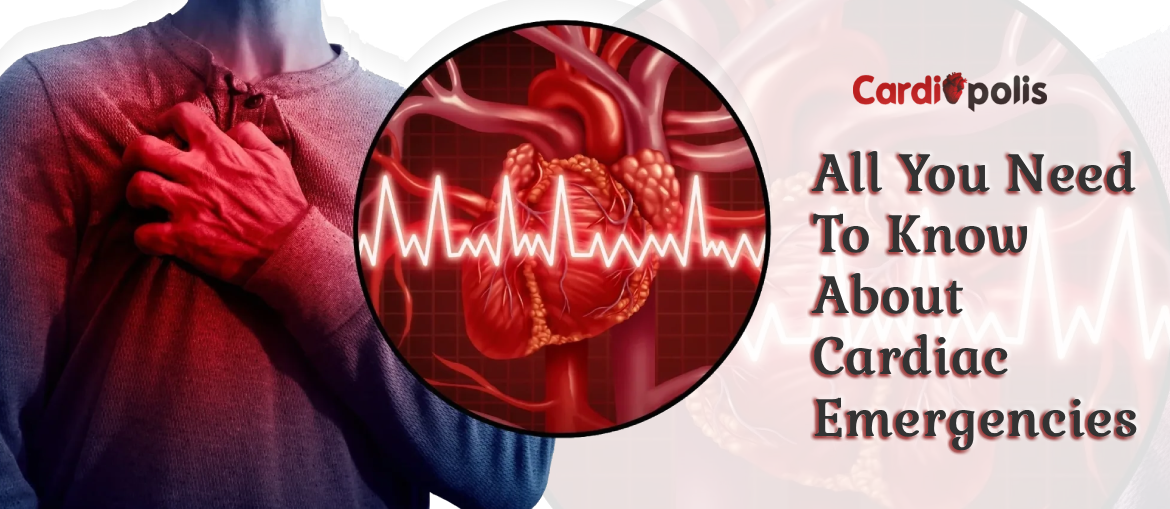Cardiac crises are serious situations in which the heart’s ability to operate is impaired and urgent medical attention is necessary. Knowing the early warning symptoms, primary causes, and prevention measures is crucial for saving lives because heart disease is still one of the top causes of death globally. Whether it’s a severe rhythm disorder, heart attack, or cardiac arrest, urgent action and awareness can make all the difference.
What is a Cardiac Emergency?
Any serious illness that affects the heart and makes it more difficult for it to pump blood efficiently is referred to as a cardiac emergency. This comprises:
- Heart attack (Myocardial infarction): Occurs when the blood supply to a portion of the heart is cut off.
- Cardiac arrest: A sudden stop of cardiac activity, frequently brought on by an electrical issue.
- Arrhythmias: Irregular heartbeats that can be either harmless or fatal.
- Heart failure: It is the result of the heart’s inability to pump blood effectively, which can cause fluid accumulation and other problems.
Major Causes of Cardiac Emergencies
A cardiac event can be caused by several underlying reasons, many of which are avoidable.
- Coronary Artery Disease (CAD): This is the most common cause. It happens when plaque accumulation causes the coronary arteries to constrict or block, limiting blood flow to the heart muscle.
- High Blood Pressure: Continuous high blood pressure puts more stress on the heart, weakening it over time and raising the chance of heart attack or stroke.
- Smoking and Excessive Alcohol Use: These habits damage blood vessels and increase the risk of heart attack.
- Unproductive Lifestyle: Obesity, high blood pressure, and low cholesterol are just a few of the heart risk factors that are increased by a lack of physical exercise.
- Genetics and Family Factors: Having a family history of heart disease raises the risk of developing heart problems, particularly when paired with bad lifestyle choices.
Early Warning Indications to Look Out For
Early detection of cardiac crises is essential for prompt assistance. Depending on the disease, symptoms might vary, but typical warning signs include:
- Chest Pain or Discomfort: Usually in the left or center of the chest, this pain is frequently characterized as fullness, squeezing, or pressure.
- Breathlessness: This can happen with or without chest pain.
- Pain in Other Areas: Shoulders, neck, jaw, or arms (particularly the left arm) may become uncomfortable.
- Cold Sweats: One of the basic warning signs is sudden, inexplicable sweating.
- Nausea or vomiting: Especially among women, nausea or vomiting is frequently mistaken for indigestion.
Risk Elements That Make People More Vulnerable
Several risk factors make some people more vulnerable to cardiac crises, including:
- Age: Risk rises with age, particularly beyond the ages of 45 and 55 for women and men, respectively.
- Gender: Although after menopause, women catch up in terms of risk, men are often at a higher risk early in life.
- Stress: Prolonged stress raises cortisol levels, which fuel inflammation and hypertension.
- Unhealthy Diet: Consuming a lot of sugar, salt, and saturated fats causes weight gain and artery disease.
- Sleep Disorders: Disorders such as breathing while sleeping can put stress on the heart and increase the risk of arrhythmias and hypertension.
Prevention Tips for a Healthy Heart
Many cardiac emergencies can be avoided with lifestyle modifications and routine medical treatment, even if certain risk factors, such as age and heredity, are uncontrollable. Here are some useful pointers:
- Eat a heart-healthy diet: Focus on fruits, vegetables, lean meats, whole grains, and healthy fats. Limit processed foods, sugar, and salt.
- Exercise Frequently: Try to get in at least 150 minutes a week of moderate aerobic exercise, such as swimming, cycling, or walking.
- Control your blood pressure and cholesterol: By taking your doctor’s prescribed medications and keeping a frequent check on your health.
- Quit Smoking: Giving up smoking can significantly lower your risk of heart disease and stroke.
- Keep Your Weight in Check: Lowering extra body fat increases insulin sensitivity, blood pressure, and cholesterol.
Although cardiac crises can happen at any time, you can significantly lower your risk by being aware of the reasons, identifying the symptoms early, and leading a heart-healthy lifestyle. Prevention and education are effective strategies that enhance quality of life in addition to saving lives. Keep in mind that survival may depend on your ability to act quickly in the case of a suspected cardiac emergency. Don’t hesitate; contact emergency services right now to get assistance.
Your heart matters. Take care of it today.

Comments are closed